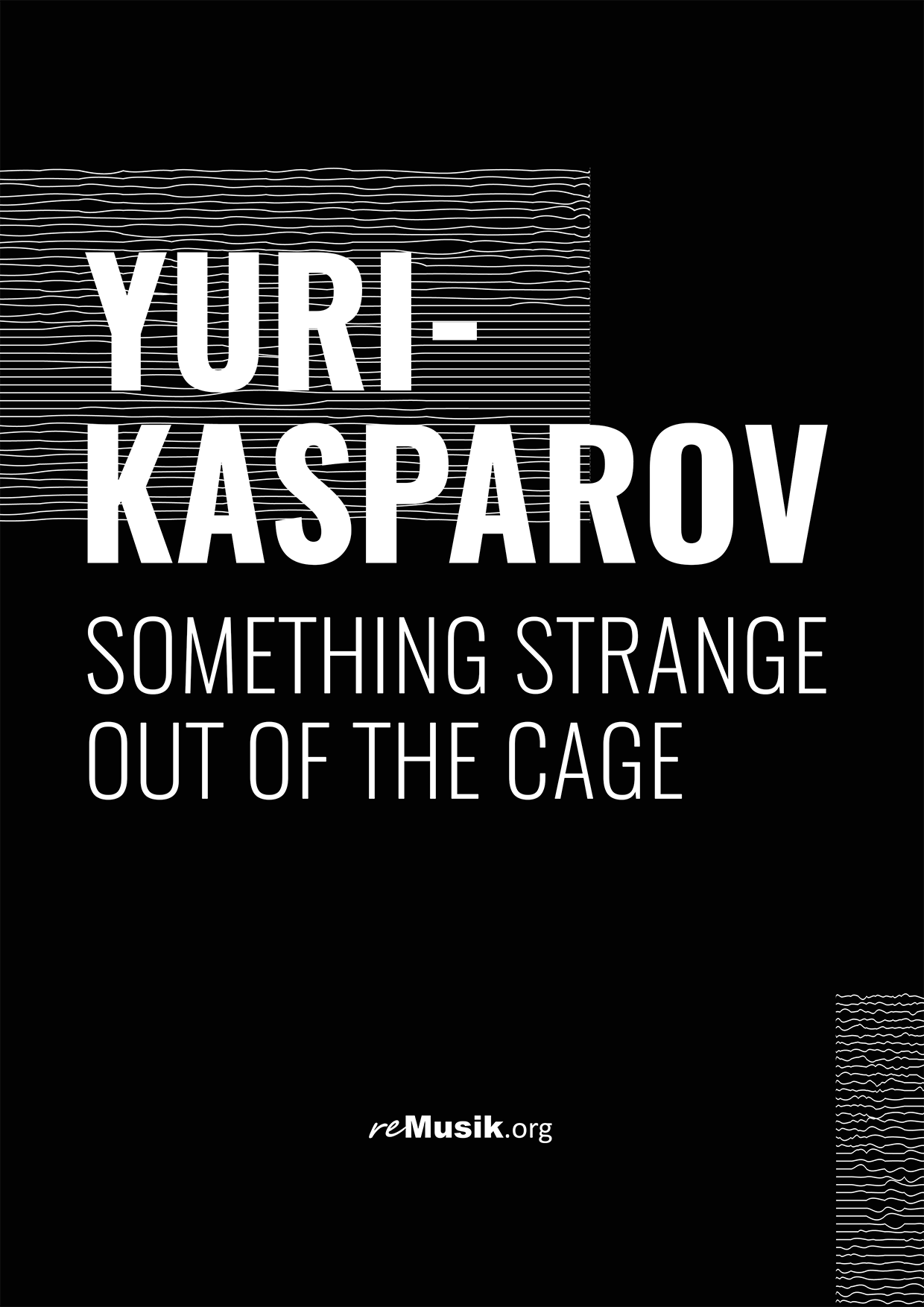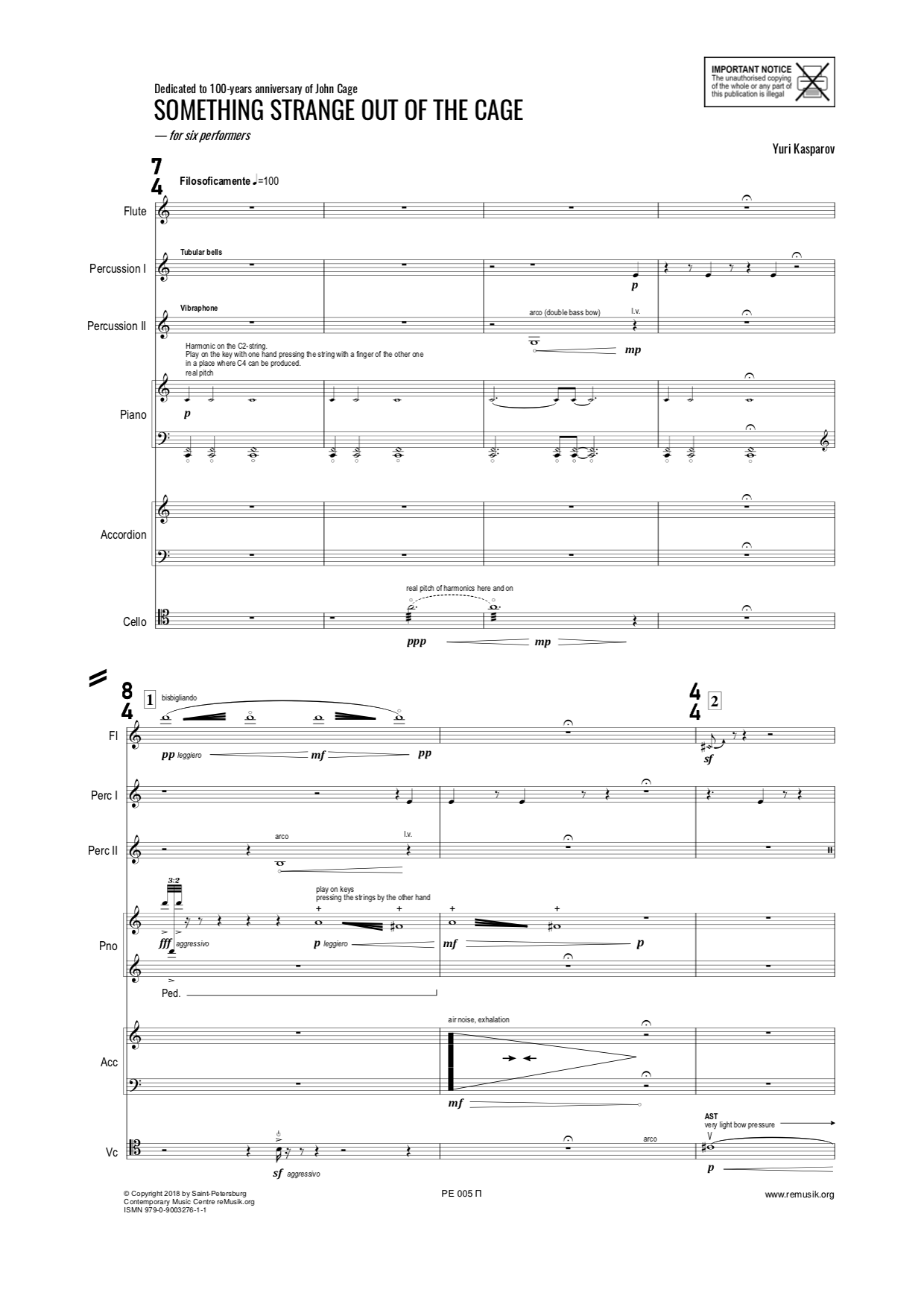NEKYIA 2.0
Video-opera by Dmitri Kourliandski, Dimitris Yalamas and Alexey Nadzharov
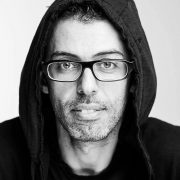
Dmitri Kourliandski
NEKYIA 2.0 is a time- and content-extended version of my 2016 Nekyia opera. The monologues are processed in a program developed together with the sound artist Oleg Makarov. This program divides material into fragments to jumble them and create a complex acoustic medium consisting of incomplete phrases and sounds beyond the logic of linear narrative: we seem to find ourselves out of time and place, where texts and voices themselves turn into the medium. In fact, this might be a typical feature of the Hades. The medium contains four monologues of the main characters in a direct presentation, however, these monologues are difficult to discern – only careful listening and long concentration on the content will make voices and texts audible.
For me, the genre of opera, even in its extreme forms that break out founding principles of the genre, means a dialogue with the history and source: mythology is the genome of opera. Throughout its history, opera has gone through (and the process is still going on) many reforms, ranging from mild to radical ones, from Monteverdi, to Gluck, Mozart, Wagner and others. In a way, the history of opera is a constant rethinking of what it is – opera tradition. We present another rethinking of fundamental principles of the genre, combined with a direct appeal to the traditional, original opera material; all of which make signs why Nekyia can be considered an opera. However, I have got used to the phrase “this is not an opera” that accompanies each of my opera premieres.

Dimitris Yalamas
The Nekyia consists of monologues of four Greek mythological heroines: Alkesta, Eurydice, Epicaste (Jocasta) and Alexandra (Cassandra). The main idea originates from the 11th song of Homer’s Odyssey. Odysseus describes how he descended into the underworld of Hades: “Suddenly the women appeared before me (…) So they came up one after the other, and each one as I questioned her told me her race and lineage” (Odyssey 233–234). Thus, the ghosts of dead women, who had long been silent, began telling their stories. Homer did not give details of these monologues, so in the Nekyia texts I tried to interpret their words into a modern poetic language and show lamenting cries of each tragic heroine.
In the music piece of Kourliandski, their voices sound subtle, abrupt, incomprehensible. They speak our language, we recognize familiar words in the recording, but we do not recognize any coherent speech. This is the language of the dead: close and at the same time very distant, familiar but completely alien, friendly and extremely frightening; but in issues of love, devotion, truth, duty, humanity, harmony, values of life and dignity, the heroines of ancient myths are close and contemporary. In the ancient world poetry, both lyrical and tragic, was unthinkable without music. Homer sang his epics accompanied by a musical instrument. The same was done by Pindar and Sappho, who sang their verses rather than wrote texts for reading as in the modern poetry. Aeschylus, Sophocles and Euripides composed their works, too: they were more like a modern opera than a drama performance. In the ancient world music and poetry were one inseparable art. Therefore, I believe that, based on this tradition, Nekyia, as a completed work of art, consists of lyrics and sounds, poetic speech and modern music.

Alexey Nadzharov
I am in charge of generative video, algorithmically synthesized from the acoustic material; it is a single visual object, which, however, does not repeat itself throughout the whole duration of the audio.
You asked if electronic sounds and visuals arose any emotions, feelings or associations with me. I will be talking about the visual imagery; however, in my opinion, the other sphere can be described the same way: for me, the answer is more in the lines of how the idea of using algorithm arises and how it is integrated into the general concept. I used generative graphics, since this technique gives an opportunity to interact with sound material directly, ensuring a long-lasting, non-repeating, but, at the same time, uniform material. For me, the conflict of formalism and feelings does have a universal nature; after all, formalization in European music appeared much earlier than the modern understanding of the term algorithmic music. As far as I am concerned, it is rather a matter of interacting with the instrument when composing (improvising), a chance to make improvisations in particular, and the whole process of composing (creating) in general.
Nekyia is Odysseus’ descend in Hades where he speaks to the dead. Each listener becomes Odysseus listening to the voices of Hades – four monologues by the heroes of Ancient Greece mythology: Alexandra, Alcestis, Eurydice and Epicasta.
Authors and participants:
Dmitri Kourliandski, music
Dimitris Yalamas, text
Alexey Nadzharov, video
Oleg Makarov, electronics
Arina Zvereva, music direction
Performers:
Alina Gorina, Katerina Andreeva, Maria Menshenina, Tatiana Perevalova.
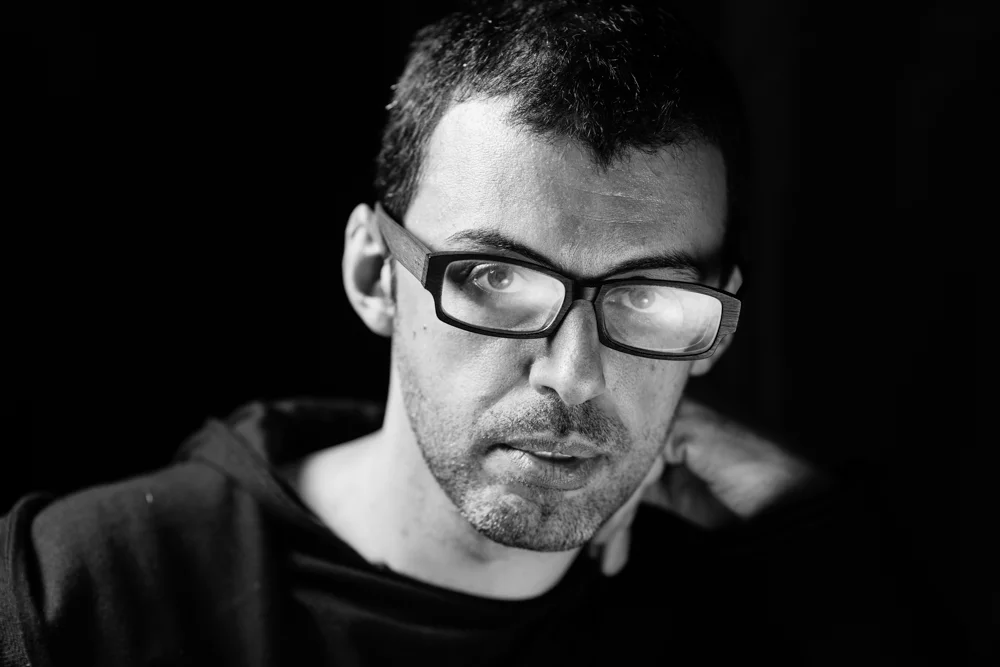
Dmitri Kourliandski, born 1976 in Moscow. Studied in Moscow conservatory with Leonid Bobylev. Winner of a number of composers competitions in Italy, The Netherlands, Switzerland, France, Austria, Russia. Since 2012 he has been invited to give master-classes and lectures in Austria, Italy, The Netherlands, Ukraine, France, Israel, Spain, Switzerland, Russia. Author of chamber, ensemble, orchestra and opera works performed worldwide at concerts and festivals by well known musicians and collectives. Portrait CDs were published at the FANCYMUSIC and Col Legno labels. Dmitri Kourliandski is the founder and artistic director of the International Young Composers Academy in Tchaikovsky city. Co-founder of the Structural Resistance group (StRes). Musical director of the Stanislavsky Electrotheatre. His works are published by Donemus, Editions Jobert and Le Chant du Monde.

Dimitris Yalamas is a philologist, diplomat, poet and librettist. He was born in Athens in 1960. He lives and works in Moscow since 1984. He writes poetry from a young age and he published several collections of his poems in Athens and Moscow. Since 2006 he has been involved in the writing of librettos for operas and other musical genres, which were staged in Moscow, Perm, Graz, ect. He worked with composers like Andreas Moustoukis (stage cantata «Deae ex machina»), Alexei Siumak (Requiem and operas «Station» and «NEMAYAKOVSKY») and Dmitri Kourliandski («Anatomy of Pain», operas «Asteroid 62», «Nosferatu», «Nekyia»). The operas were staged by outstanding artists like the maestro Teodor Currentzis, theater directors Kirill Serebrennikov and Theodoros Terzopoulos, the visual artist Yannis Kounelis and others.
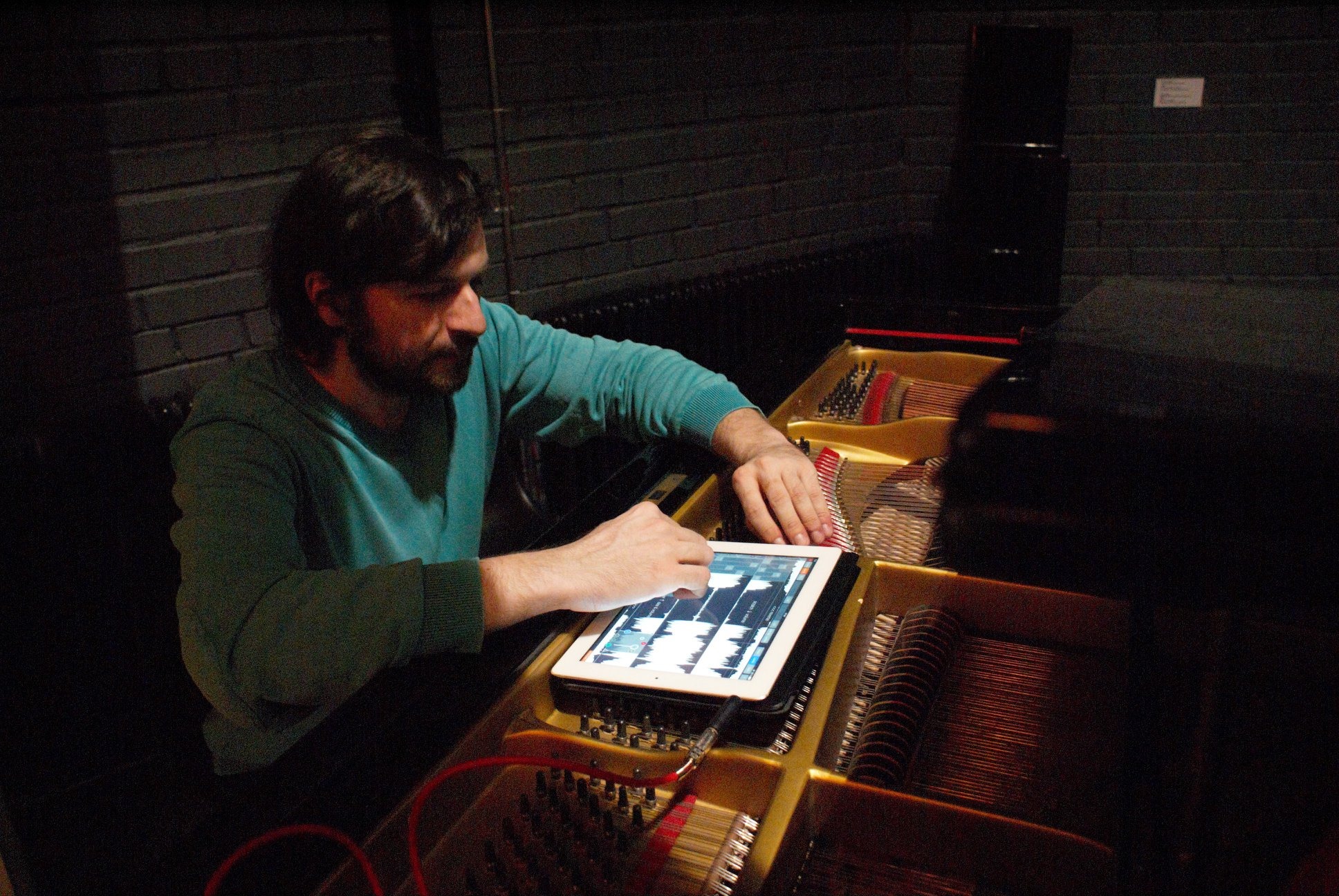
Alexey Nadzharov, born in 1983 in Moscow. Began to study music at seven, learning clarinet and piano and later saxophone and electronic music. Studied jazz piano in E. Grechishev class. Graduated Moscow State Conservatory, composition department, prof. Yuri Vorontsov’s class in 2006, post-graduate course in 2009. Working at Moscow State Conservatory Centre for electroacoustic music (CEAMMC, since 2009). Music was performed by ensembles “Studio for new music ensemble” (Moscow, RU), De Ereprijs (Apeldoorn, NL), Ensemble Multilatérale (Paris, FR), “Alter ego ensemble” (Rome, IT), eNsemble (Saint Petersburg, RU), Moscow Contemporary Music Ensemble (RU), Ensemble Modern (Frankfurt, DE).
The first version was implemented in 2019 with the support of the Voznesensky Fund and Center and published on FANCYMUSIC.
Free Download of the audio opera by Dmitri Kourliandski is on the composer`s personal page on bandcamp.
TEXTS
(Eurydice was the wife of Orpheus, the gods’ troubadour. She was mortally bitten by a snake. The mournful singing of her loving husband moved the gods and nymphs, and they advised him to look for his wife in the realm of Hades. There, Orpheus sang for Pluto and Persephone; he became the sole human who had succeeded at finding soft strings in their hearts. He was allowed to take Eurydice back to the world of the living, provided that he would not turn around to see her before they reach the world of the living. However, Orpheus could not restrain himself: he did turn around, and Eurydice vanished…) Translated by Steven Saymour
I
walk
my arms
keep growing
soon
blood-carrying branches
will crop up
on them
owls
will perch on those branches
and puff
into my eyes
I can
hardly
see you
the living
walk
too fast
I
walk
behind
you
my arms
keep growing
soon
they will blossom
with mammalian flowers
worms
will eat those flowers
and
will cough up my blood
I can
hardly
hear you
the living
forget
too soon
I
walk
behind
you
step after step
my arms
keep growing
soon
carnivorous berries
will ripen
on them
the wicked
will drink
the juice of the berries
they will think
I am
the tree
of Eden
the dead
have
no voice
turn around
I am
your
wife
for the rest
of our
death
look
at me
and
you
go
on
I’ll
stay
here
forever
(According to Homer, Odysseus descended into Hades to seek advice from a dead seer named Tiresias. However, the legend has it that the dead are deprived of voice: they acquire it only if they imbibe of sacrificial blood. Prior to his descent into the realm of the dead, Odysseus offered a sacrifice to gods and took with him some of the sacrificial blood. In Hades, he met his kin, friends, and some of the famed heroes of the past. Among others, he met Jocasta, the Queen of Thebes and the mother and the wife of Oedipus (Homer refers to her as Epicasta). Odysseus gave her a drink of the sacrificial animal’s blood and listened to her monolog…) Translated by Steven Saymour
can you
hear me?
with a shard
of an antique
mirror
that comes from
the royal palace
of Thebes
my former
home
I
slash
my
belly
cold it is in Hades
husband of mine
enter me
to exit
as my father
can you
hear me?
with my finger
I write
in blood
on the walls
of my
cell
with my finger
I write
from the inside
of my
dried
skull
I look
at you
through the windows
of the hollows
that
once
held
my
eyes
cold it is in Hades
father of mine
enter me
to exit
as my son
can you
hear me?
I tear
bed sheets
wipe off
the blood
and
weave
a ladder
to heaven
I rip out
my
womb
and raise it
in my hands
before
you
I fear
neither blood
nor pain
nor the wrath of gods
the dead
know not
fear
cold it is in Hades
son of mine
enter me
to exit
as my god
can you
hear me?
each
day
I ready myself
for a long
journey
I dye
my
hair
with chalk
cut the skin
of my
face
with
iron rods
cover
myself
with a shroud
throw a noose
over
my
neck
put
a coin
in my mouth
and
stand
before
you
cold it is in Hades
god of mine
enter me
to stay there
forever
(Alcestis is a young woman, the wife of Admetus, the King of Pherae; she is a beloved daughter, wife, and mother. She has agreed to descend into Hades instead of her husband. The audience hears a monolog of Alcestis who has been buried alive. According to Euripides, Heracles is expected to save her by conquering the god of death. However, Heracles is nowhere in sight. Alcestis has only 50 minutes left to live) Translated by Steven Saymour
I have left
for a distant
land
of red sounds
into the earth
of ailing colors
into the realm
of torn up smells
under the sky
that holds no
water
under the earth
that has no
sky
under the water
where there is no
earth
to the realm
where
even
emptiness
does not exist
I the disgraced
Queen
who has
sacrificed
her life
for the sake
of earthly
love
for a man
summer
in my homeland –
and hounds
in sleep are flying
the moon
waning
mad
possessed
scribbles
for me
the news
on the crumbling
furniture
of the palace:
gold
an omen
of parting
silver
an omen
of sorrow
the purple
the usual
omen
of death
summer
in my homeland
cramped up
all furniture
should have long
been covered
with cloth
stifling
the dead
should have
long
been carried out of the room
it is dark
the dishes
should have
long
been buried –
earth
is bleeding
in a cup
summer
in my homeland –
angels
in sleep
are howling
Heracles
will not come
I do not believe
the oracles
here
I shall remain
and shall wake up
twenty-five
centuries
later
in a common
grave
of a common
woman
clad in common
clothes
and
shall die
a common
death
following
the prescribed
50 minutes
of agony
and
I shall be
the disgraced
Queen
who has sacrificed
her life
for the sake
of earthly
love
for a man
and
all shall be forgotten
and
all shall be forgotten by you
and
all shall be forgotten by you forever
(Alexandra also known as Kassandra, the Princess of Troy , was a daughter of King Priam. She was given the gift of prophecy, but cursed by the god Apollo so that no one believed the prophecies she uttered. At the fall of Troy, Cassandra sought shelter in the temple of Athena, but was raped there by Ajax the Lesser, son of Oileus. Later she was taken by King Agamemnon as a concubine. The king fell in love with Alexandra and took her to Mycenae, where both of them were murdered by Agamemnon’s wife Clytemnestra and her lover Aegisthus) Translated by Stanislav Lvovsky
i fell
fell to bits
to pieces
doctors
sewed
my hands on
where my legs
were
sewed my
eyes on
instead of
ears
my teeth
in place
of hands and
I wandered
the streets
like this
saying hello
to people
like this —
buying potions
from the drowned
fisherman —
selling poisons
to the hanged
maid
treating a shattered
boy with honey
cookies
that woman
she sat
in the market
asked
for water
made presents
of salt
to bypassers
strangers
she had long
tentacles
for hair
sticky unruly
she begged
“stop
scaring
passersby”
she begged
“stop
weaving
perdition”
but they disobeyed
they were screaming
murder squealing
and their
scream was disturbing
the dead
“not the time”
they kept saying
“now is not
the time
to officiate
rains”
they said
the deceased
i fell fell
to pieces
to bits
doctors
came
sewed
my legs on
to where my
belly was
reattached
eyelids
instead of lips
replaced
my tongue
with one
of the eyes
I wandered
the streets
like this
saying hello
to people
like this —
and that
mother she sat
in the square
with two
boys born
eyeless
telling them
of
the sea
of
the sky
of
the forests
and they
listened
their mouths
open
and there
they were
instead of
teeth —
the sea
and
the sky
and
the forests
and their childish
penises
covered
in scales
penises
with venomous
fangs
reached out
to their faces
and bit
and the boys
falling slowly
asleep spelled
doom to the city
prophesied
fires and
downfall and
famine and
then ceased
to listen
once more
to their mother
telling them of
the sea
and
the sky
and
the forests
i fell fell
to bits fell
to pieces
doctors
they sewed
my hair on
in place
of my breasts
reattached
fingers instead
of ribs
nipples instead
of knees
i wandered
the streets
like this
saying hello
to people
like this —
and the wind
was blowing
maleficent
wind
carrying
odor
of the future
infirmaries
shimmering
wind
threshing me
with its frosts
and i saw
this wind
breathing
not like a wind
like a demon
of harm
and death
saw it embracing
virgins
from behind
exposing their
breasts
exposing their
thighs
saw it kissing
their lips
covering them
with shiver
unknown before
saw it
entering
their bodies
and planting
its poisonous
seed
in your daughters’
wombs
planting
its poisonous
seed
in your daughters’ daughters’
wombs
planting
its poisonous
seed
in your daughters’ daughters’ daughters’
wombs
for ever

